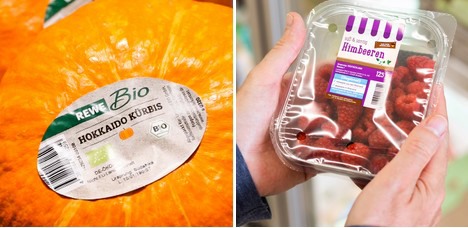Bye bye plastic: At REWE and PENNY, more and more fruits and vegetables are offered unpackaged. But completely dispensing with packaging is not always sensible, as a long-term test has shown.
Despite the ongoing corona crisis and its severe impact on supermarkets, supply chains and agriculture, REWE is not losing sight of the packaging issue. REWE is the first of the four largest food retailers in Germany to offer organic fruit and vegetables nationwide, largely without plastic or with improved packaging. As a result, 210,000 kilograms of plastic and 80,000 kilograms of paper can be saved annually. But it is not so easy to do without packaging altogether - and in many places it does not make sense either, as an "unpackaged test" in 630 REWE and associated stores has shown.

After all, plastic packaging can help ensure the freshness, quality and hygiene of products from the field to the supermarket. This makes particular sense if a product can be protected against premature spoilage in this way.
"This is the case with broccoli, for example, which quickly turns yellow and unsightly without packaging", says Stephan Weist, Divisional Manager for Fruit/Vegetables/Flowers and Plants at REWE Group. "As a result, less is bought and we have to throw away a lot more". In the case of organic iceberg lettuce, this means that without packaging, around 3,000 kilograms of plastic would be saved each year nationwide, on the one hand. However, on the other hand, around 18.5 tons would lose so much freshness and quality that it would become unsaleable. In this case, the thin films effectively prevents food waste.
For more freshness and quality
A similar effect can be observed with berries that lose moisture very quickly without packaging. The sensitive skin will then crack, collapse and become moldy. Packaging also provides great protection against damage and soiling for such sensitive goods. If a packaging cannot simply be omitted, we improve the existing packaging as much as possible: In the meantime, mainly material-saving sealed plastic or cardboard trays are used, which even do without the previously usual wrapping with a thin plastic film (flowpack).
With loose fruit such as grapes, packaging is also useful for transporting it comfortably without accidents. "How else can you bring these things home safely?" Weist asks. To prevent them from being damaged and dispersed throughout the shopping cart, practical paper carrier bags are now being used instead of plastic packaging. For fruit varieties such as strawberries, packaging also helps to bundle them into useful sales units. This way, customers can be sure that a 500g punnet always contains the specified quantity.
Distinctness and traceability
In the case of product groups with numerous varieties on the shelf -tomatoes and apples, for example- it is also helpful at the checkout to be able to see which variety you are buying and whether it is organic or conventionally grown. In this case, packaging guarantees traceability and distinguishability, enables additional information, facilitates checkout by means of codes and serves the labelling requirements (e.g. ingredients, allergens). In addition to an adhesive label or banderole for identification purposes, we now often use organic cotton nets.
However, there are also framework conditions that REWE cannot influence: For example, a changeover to a more resource-saving or environmentally friendly alternative packaging type is often difficult due to the given possibilities of the suppliers. "The example of pumpkins makes this particularly clear: This is a high investment for a relatively short season," says Weist. "We can't tell our small regional producers, who are spread all over Germany, that they all have to change over to laser machines, for example, if we ourselves are not sure whether this will really still be the best option in a few years' time." In the end, this is a matter of weighing up the options. A branding like that of sweet potatoes, which are imported centrally via the port of Rotterdam, lasered there and transported onward, is therefore hardly possible.
And in the case of carrots, the test revealed a completely different phenomenon: During the period when organic carrots were offered in bulk, demand dropped significantly. In contrast, more and more customers were reaching for the packaged, conventional carrots. The consumer therefore clearly chooses for the packaged option. Furthermore, even if the carrot is qualitatively still ok, it will become rather soft due to the lack of moisture. This development is not unusual for most hard produce.
Still at the start of a long journey
REWE has already made more than 1,200 private label packages more environmentally friendly across all product areas, according to their motto "Avoid, Reduce, Improve". However, the changeover is far from over. Whether it's "natural branding", reducing film thicknesses or switching from film packaging to adhesive banderoles, adhesive labels and panicle plugs in herb pots - there's still a lot to be done on the shelves. "We are at the start of a very long journey. Our shelves already look pretty good today, but there is still a relatively large amount of plastic," says Stephan Weist. "I'm sure that the department will look completely different again in the next two to three years. Every week, we're looking at new ideas to see how this can help us get ahead.
For more information:
https://magazin.rewe-group.com/verpackung
